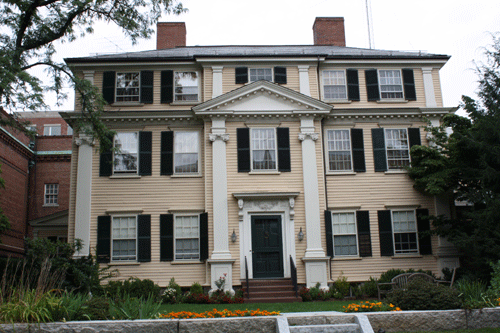The Flight of the Cambridge Loyalists, part 1
The Cambridge neighborhood later dubbed “Tory Row” became a lot less populous after the “Powder Alarm” of 1774—which was only natural since all of those estates’ owners were either targets of the crowds or related to targets.
Attorney general Jonathan Sewall was the first to depart. He arrived in Boston “between 12 & one” on 1 September, having been “advised to leave his house,” according to a letter from his father-in-law, Edmund Quincy. (That letter is in the Massachusetts Historical Society’s Miscellaneous Bound Manuscripts collection.)
William Brattle also left Cambridge on 1 September after learning that his letter to Gov. Thomas Gage, quoted here, had become public in Boston that afternoon. And that evening, a local crowd came looking for Brattle and Sewall.
Late the next afternoon, Lt. Gov. Thomas Oliver faced off against what he counted as 4,000 men demanding his resignation from the Council. After signing their document under protest, he also hightailed it to Boston.
If Elizabeth Oliver and her children didn’t accompany Thomas to Boston then, they followed within days. So did Esther Sewall and her children.
William Brattle’s daughter, the widow Katherine Wendell, remained in the family’s Cambridge home—not only for the next several months but through the siege of Boston. She thus kept ownership of the house for the family while several nearby properties were confiscated by the state during the war.
Thomas Oliver’s wife Elizabeth was a Vassall by birth, and thus related to several other families in the area. One of her maternal uncles was David Phips, the royal sheriff of Middlesex County. Notes taken by the Loyalists Commission say:
The Borlands also felt the “Powder Alarm” was too close for their comfort and moved into Boston. The 8 June 1775 New-England Chronicle reported:
TOMORROW: More departures.
Attorney general Jonathan Sewall was the first to depart. He arrived in Boston “between 12 & one” on 1 September, having been “advised to leave his house,” according to a letter from his father-in-law, Edmund Quincy. (That letter is in the Massachusetts Historical Society’s Miscellaneous Bound Manuscripts collection.)
William Brattle also left Cambridge on 1 September after learning that his letter to Gov. Thomas Gage, quoted here, had become public in Boston that afternoon. And that evening, a local crowd came looking for Brattle and Sewall.
Late the next afternoon, Lt. Gov. Thomas Oliver faced off against what he counted as 4,000 men demanding his resignation from the Council. After signing their document under protest, he also hightailed it to Boston.
If Elizabeth Oliver and her children didn’t accompany Thomas to Boston then, they followed within days. So did Esther Sewall and her children.
William Brattle’s daughter, the widow Katherine Wendell, remained in the family’s Cambridge home—not only for the next several months but through the siege of Boston. She thus kept ownership of the house for the family while several nearby properties were confiscated by the state during the war.
Thomas Oliver’s wife Elizabeth was a Vassall by birth, and thus related to several other families in the area. One of her maternal uncles was David Phips, the royal sheriff of Middlesex County. Notes taken by the Loyalists Commission say:
He apprehended that his Life was in danger after he had removed the Gunpowder to Boston. . . . In Consequence of this treatment he removed himself to Boston & his family soon followed him.Elizabeth Vassall’s paternal aunt Anna had married her stepbrother John Borland when she was thirteen and he twenty. In 1774 they lived in a Cambridge mansion originally commissioned by the Rev. East Apthorp, not counted as part of “Tory Row” since it wasn’t on the road to Watertown but near Harvard College. (In fact, today that house, shown above, is in the middle of the university’s Adams House.)
The Borlands also felt the “Powder Alarm” was too close for their comfort and moved into Boston. The 8 June 1775 New-England Chronicle reported:
DIED ] At Boston, on the 5th Instant [i.e., of this month], John Borland, Esq; aged 47 [actually 46]. His Death was occasioned by the sudden breaking of a Ladder, on which he stood, leading from the Garret Floor to the Top of his House.According to none other than Jonathan Sewall, Borland “lost his life by a fall in attempting to get upon the top of his house to see an expedition to Hog Island.”
TOMORROW: More departures.


